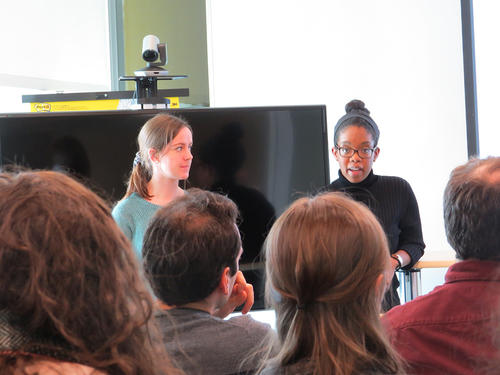
Wright Laboratory (Wright Lab) and the Yale Quantum Institute (YQI) hosted the first Yale Instrumentation Lunch on Tuesday, February 19, on the topic “Quantum Sensors: Opportunities and Applications.”
47 participants from Applied Physics, Astronomy, Chemistry, Physics, Wright Lab and the Yale Quantum Institute attended the event, which was held in the Wright Lab meeting room WL-216.
Wright Lab Director and Physics professor Karsten Heeger gave an introductory presentation, followed by talks from Steven Girvin, Eugene Higgins professor of Physics; Rob Schoelkopf, Sterling Professor of Applied Physics and professor of Physics; Danielle Speller, postdoctoral associate in Physics and Kelly Backes, graduate student in Physics; Jack Harris, professor of Physics; and David Moore, assistant professor of Physics. Laura Newburgh, assistant professor of Physics was unable to attend, but sent a slide, which is linked, below, along with the other talks.
- Karsten Heeger, “Quantum Sensors: Opportunities and Applications”
- Steven Girvin, “Introduction to Quantum Amplification”
- Rob Schoelkopf, “RF Control Electronics for Superconducting Qubits”
- Danielle Speller and Kelly Backes, “Quantum Sensors for Axion Detection with the Haloscope at Yale Sensitive to Axion CDM (HAYSTAC)”
- Jack Harris, “Optomechanical quantum sensors”
- David Moore, “Precision force sensing”
- Laura Newburgh, “Superconducting Quantum Interference Device (SQUID) at the Atacama Cosmology Telescope (ACT)”
In 2018, Yale released the report of the University Science Strategy Committee, identifying the most promising opportunities for investment across scientific disciplines. Instrumentation is one of four recommended areas for cross-cutting investment by Yale.
The Yale Instrumentation Lunch series aims to bring together researchers from across campus to discuss topics related to novel instrumentation. The objectives are to foster interdepartmental connections and identify new opportunities in instrumentation.